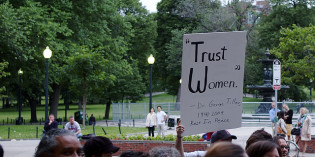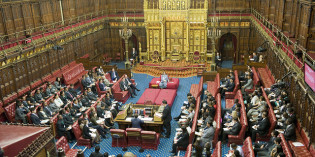Parliament

Book Review: The End of Representative Politics by Simon Tormey
In The End of Representative Politics, Simon Tormey challenges the assumption that politics and democracy are ‘dead’, blighted by chronic distrust of the political class and undermined by the perceived failure of representative democracy to secure social justice. As Tormey instead points towards emergent forms of ‘subterranean’ politics indicative of a ‘post-representative’ era, Ali Dadgar […]

A boundary allocation entailing more competitive results would not necessarily be more ‘political’, but it would be more democratic.
A recent post by Ron Johnston, Charles Pattie and David Rossiter objected to an idea published in the IPPR Democracy Commission which suggested that the UK Boundary Commission should take a more active role in creating ‘competitive’ constituencies on the grounds that it would politicise the neutral process by which boundaries are decided. Here, the […]

The election of an ‘outsider’ as Labour leader is linked to new selection rules and the ideological alternative on offer
Conventional wisdom has it that rank outsiders do not become leaders of ‘mainstream’ British parties, yet Jeremy Corbyn now presides over the Labour Party. Pete Dorey and Andrew Denham reflect on the criteria which have fed into leadership selection before now and argue it was changes to the selection rules and the offer of a […]

Judges and select committees: a developing accountability culture
The specific scenario in which select committees seek evidence from a judge who has chaired an inquiry generates a lot of heat and light. But Patrick O’Brien indicates that the research he conducted with Robert Hazell shows the practice of judges giving evidence to parliamentary committees has been widely accepted as a positive and productive […]

The blurring of party-political and parliamentary roles can impede the effectiveness of regulatory regimes
The way in which political parties use state resources indirectly (e.g., parliamentary expenses) receives substantial attention in public debate, particularly when surrounded by perceptions of misuse. Nicole Bolleyer looks at the different ways in which parliamentary resources are used in party-political ways, and argues that attempts to bring about reform will be limited by the […]

Parties should choose their leadership team with gender balance in mind
The new Leader of the Labour Party, his Shadow Chancellor, Shadow Home Secretary, and Shadow Foreign Secretary are all men, as is the party’s candidate for Mayor of London. Sarah Childs and Meryl Kenny argue that the mechanisms to ensure greater gender representation are available for any political party which seeks to achieve gender process […]

Is David Cameron actually seeking to destroy the Lords?
Yesterday’s new peerage appointments attracted almost universal criticism for further adding to the inexorable growth in size of the House of Lords under David Cameron. But could the gradual erosion of the Lords’ reputation actually benefit the government by weakening parliament? Might it even be a deliberate plan? And – given that the Prime Minister […]

Evidence from Belgium shows that gender quotas do not necessarily eliminate voter bias against women candidates
To what extent do electoral gender quotas change voters’ preference for male or female political candidates? Silvia Erzeel and Didier Caluwaerts examine the electoral evidence from Belgium, a country that has progressively adopted gender quota laws since the mid-1990s. They show that although the largest group of Belgian voters now vote for both male and […]

The Constitutional Standards of the House of Lords’ Constitution Committee: A valuable tool for enhancing scrutiny
To mark the launch of the second edition of The Constitutional Standards of the House of Lords Constitution Committee, Jack Simson Caird considers the role that a set of constitutional standards could play in the current government. Drawing on the example of English votes for English laws, he argues that such a code would increase […]

Westminster will benefit from greater Scottish influence more than it expects
The SNP swept the board at the 2015 General Election, with the party winning all but two parliamentary seats (al beit in an unrepresentative First Past the Post election). One of their number Stephen Gethins argues that Westminster has much to learn from the way Holyrood has worked in recent years, and that his party […]


 Democratic Audit's core funding is provided by the Joseph Rowntree Charitable Trust. Additional funding is provided by the London School of Economics.
Democratic Audit's core funding is provided by the Joseph Rowntree Charitable Trust. Additional funding is provided by the London School of Economics.